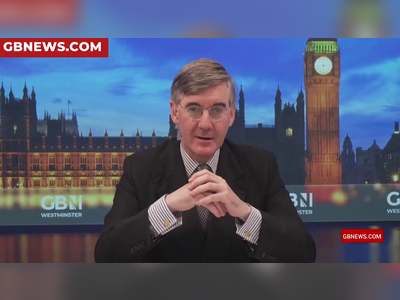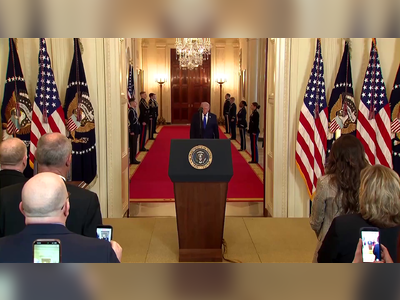
Why has Britain become numb to the horror of deaths caused by incompetence? | Polly Toynbee
Coronavirus has killed nearly 100,000 in this country, yet Boris Johnson’s dither and delay is forgiven
Shockability is a primal quality. Lose that, and you lose all humanity. Latest figures say there have been 93,000 deaths involving Covid-19 in the UK. I am trying to imagine how high 93,000 stacked coffins would reach, or how deep a plague pit would be to hold 93,000 bodies. Because they are disposed of decorously out of sight, there are no such gruesome pictures to jolt the senses.
The Guardian has done its best to remember some of the people who have died of Covid: their stories, those family tragedies. Yet still there’s something missing, in a national sense of the true horror that has descended on us. A plane crash, an earthquake, wildfires, the twin towers falling – those shockingly visual news events immediately clutch the heart.
These pandemic deaths outpace those from the blitz and flying bombs (estimated at 61,000 deaths), yet somehow, the ONS daily tolling the bell for our fast-rising dear departed hasn’t shaken the country enough.
A wilful denial clings to the alienating reassurance that the dead are all old, unhealthy or with “underlying conditions” – even though some of those “conditions” turn out to be far too mild to account for a death. Regardless of age, hundreds of thousands of very good life years are being lost, as measured in quality adjusted life years (QALYs), the figure used by the National Institute for Health and Care Excellence to estimate life-saving value in drugs and treatments.
Back in August’s phoney Covid peace, in our eat-out-to-help-out madness moment, the ONS was estimating the health impacts of contracting Covid-19: “between March 2020 and March 2021, these represent 570,000 lost QALYs”. Projecting ahead over five years, the ONS found “the impacts of lockdown and a resulting recession are estimated to reduce England’s health by over 970,000 QALYs”.
But that was before the second, and now third, wave of the virus, with present infection rates surpassing 2020 highs, hospitals at bursting point and a likely three-month lockdown which will cause further loss of QALYs.
What should shock us to the marrow is how many of those lost good years could have been saved. That’s not new news, as numerous scientists, including those on the Scientific Advisory Group for Emergencies (Sage), have said thousands of lives would have been saved with an early March lockdown, when Boris Johnson still larked about shaking hands.
The timeline of failure to act is too painfully familiar to rehearse, but that summer photo of maskless Rishi Sunak serving food to customers taking his bribes to go out breathing on each other in restaurants may be career-defining. Does it shock enough now, looking back?
The government’s deadly repetition of the same blunders should shock; all that dither, delay and deference to the lunatic libertarian fringe who continuously argue against lockdowns.
What swayed Johnson to close schools between Sunday’s The Andrew Marr show and Monday’s U-turn? The polling, No 10’s own and the likes of Savanta Comres finding 79% of the public back the lockdown, only 9% against: the people are wiser than the rightwing headbangers. Last September, Michael Heseltine captured Johnson’s leadership style: he “waits to see the way the crowd is running and then dashes in front”.
Even so, the country seems not yet sufficiently shocked by its prime minister, nor by thousands needlessly dead. They knew what they were getting when they elected Johnson, and his party is still level pegging with Labour in the polls. In other words, Britain’s shockability seems a bit weak. Everyone sees the test and trace fiasco (test results never even arrived for some of my Covid-stricken family – on phoning to find out more, they were told “they often get lost”), despite vast sums of money spent on private companies.
Failure of that “moonshot” suggests that it’s optimistic to hope the vaccine will be delivered to timetable: GPs are already cancelling vaccination sessions, held back by lack of promised supply. Airports, meanwhile, remain wide open to any infected new arrivals, while Priti Patel chases headlines over a handful of far less dangerous people to deport.
Numerous Covid contracts have gone to companies and individuals with connections to the Conservative party, while elsewhere Tory donors are given peerages or the BBC chair, but all seem to fall below the national shock threshold. Are we inured to it, is this who we are?
The pandemic lifts social paving stones to reveal the depths of deprivation among children. How can 1.3 million children have no access to laptops and wifi after nine months of missed schooling? It takes the great Marcus Rashford to force a grudging minimal recognition by the government of child hunger.
But the needle on the shock-o-meter over Britain’s gross poverty and inequality moves slowly: Opinium polling for Compassion in Politics records a little improvement – half think that poverty is the result of the system, 24% think it’s the fault of the individual; while 66% think benefits should cover the cost of food, housing and bills. Ipsos Mori finds only 59% support keeping the £20 extra on universal credit after April. Is that enough to prompt action from the perennial crowd-follower Johnson? Yes, probably.
Those who claim to put the economy first might be shocked by this week’s annual Financial Times survey of 90 leading economists: not only is Britain top of the EU charts for infections and deaths, but our economy will be slowest to return to pre-pandemic levels, due to Covid and Brexit mismanagement.
Reading many of these stories in the Guardian means you may not be deficient in shockability but, as yet, such feelings don’t seem to be shared quite so widely. While the grotesque events in the US of Donald Trump’s last days in power lend our own government a little comparative edge, the deadbeat incompetence of cabinet ministers at the most basic tasks should by now have the whole country aghast, astounded and shocked to the very core at what we have become.
The Guardian has done its best to remember some of the people who have died of Covid: their stories, those family tragedies. Yet still there’s something missing, in a national sense of the true horror that has descended on us. A plane crash, an earthquake, wildfires, the twin towers falling – those shockingly visual news events immediately clutch the heart.
These pandemic deaths outpace those from the blitz and flying bombs (estimated at 61,000 deaths), yet somehow, the ONS daily tolling the bell for our fast-rising dear departed hasn’t shaken the country enough.
A wilful denial clings to the alienating reassurance that the dead are all old, unhealthy or with “underlying conditions” – even though some of those “conditions” turn out to be far too mild to account for a death. Regardless of age, hundreds of thousands of very good life years are being lost, as measured in quality adjusted life years (QALYs), the figure used by the National Institute for Health and Care Excellence to estimate life-saving value in drugs and treatments.
Back in August’s phoney Covid peace, in our eat-out-to-help-out madness moment, the ONS was estimating the health impacts of contracting Covid-19: “between March 2020 and March 2021, these represent 570,000 lost QALYs”. Projecting ahead over five years, the ONS found “the impacts of lockdown and a resulting recession are estimated to reduce England’s health by over 970,000 QALYs”.
But that was before the second, and now third, wave of the virus, with present infection rates surpassing 2020 highs, hospitals at bursting point and a likely three-month lockdown which will cause further loss of QALYs.
What should shock us to the marrow is how many of those lost good years could have been saved. That’s not new news, as numerous scientists, including those on the Scientific Advisory Group for Emergencies (Sage), have said thousands of lives would have been saved with an early March lockdown, when Boris Johnson still larked about shaking hands.
The timeline of failure to act is too painfully familiar to rehearse, but that summer photo of maskless Rishi Sunak serving food to customers taking his bribes to go out breathing on each other in restaurants may be career-defining. Does it shock enough now, looking back?
The government’s deadly repetition of the same blunders should shock; all that dither, delay and deference to the lunatic libertarian fringe who continuously argue against lockdowns.
What swayed Johnson to close schools between Sunday’s The Andrew Marr show and Monday’s U-turn? The polling, No 10’s own and the likes of Savanta Comres finding 79% of the public back the lockdown, only 9% against: the people are wiser than the rightwing headbangers. Last September, Michael Heseltine captured Johnson’s leadership style: he “waits to see the way the crowd is running and then dashes in front”.
Even so, the country seems not yet sufficiently shocked by its prime minister, nor by thousands needlessly dead. They knew what they were getting when they elected Johnson, and his party is still level pegging with Labour in the polls. In other words, Britain’s shockability seems a bit weak. Everyone sees the test and trace fiasco (test results never even arrived for some of my Covid-stricken family – on phoning to find out more, they were told “they often get lost”), despite vast sums of money spent on private companies.
Failure of that “moonshot” suggests that it’s optimistic to hope the vaccine will be delivered to timetable: GPs are already cancelling vaccination sessions, held back by lack of promised supply. Airports, meanwhile, remain wide open to any infected new arrivals, while Priti Patel chases headlines over a handful of far less dangerous people to deport.
Numerous Covid contracts have gone to companies and individuals with connections to the Conservative party, while elsewhere Tory donors are given peerages or the BBC chair, but all seem to fall below the national shock threshold. Are we inured to it, is this who we are?
The pandemic lifts social paving stones to reveal the depths of deprivation among children. How can 1.3 million children have no access to laptops and wifi after nine months of missed schooling? It takes the great Marcus Rashford to force a grudging minimal recognition by the government of child hunger.
But the needle on the shock-o-meter over Britain’s gross poverty and inequality moves slowly: Opinium polling for Compassion in Politics records a little improvement – half think that poverty is the result of the system, 24% think it’s the fault of the individual; while 66% think benefits should cover the cost of food, housing and bills. Ipsos Mori finds only 59% support keeping the £20 extra on universal credit after April. Is that enough to prompt action from the perennial crowd-follower Johnson? Yes, probably.
Those who claim to put the economy first might be shocked by this week’s annual Financial Times survey of 90 leading economists: not only is Britain top of the EU charts for infections and deaths, but our economy will be slowest to return to pre-pandemic levels, due to Covid and Brexit mismanagement.
Reading many of these stories in the Guardian means you may not be deficient in shockability but, as yet, such feelings don’t seem to be shared quite so widely. While the grotesque events in the US of Donald Trump’s last days in power lend our own government a little comparative edge, the deadbeat incompetence of cabinet ministers at the most basic tasks should by now have the whole country aghast, astounded and shocked to the very core at what we have become.










